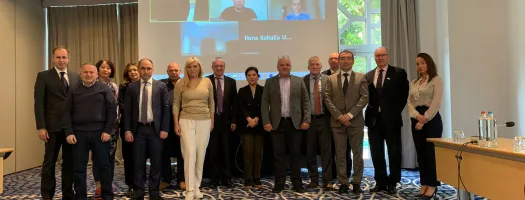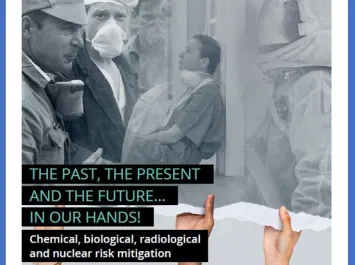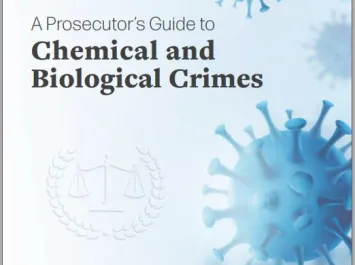On 16 October 2023, the South East and Eastern Europe (SEEE) region hosted its regular CBRN National Focal Points (NFP) Meeting in Brussels, Belgium. The meeting was organised within the framework of the European Union’s Chemical, Biological, Radiological and Nuclear (CBRN) Risk Mitigation Centers of Excellence (EU CBRN CoE) Initiative. It took place in a hybrid format, bringing together the NFPs and their representatives, the European Commission officials, the SEEE Regional Secretariat, and the European Union project implementing consortia.
The primary purpose of the meeting was to hear updates on completed and newly launched projects from the project implementing consortia, verify the validity of the regional priorities identified in the CBRN Regional Action Plan, identify priority areas for new regional projects, and discuss the planning of the regional field exercise. Every CBRN National Focal Point received a detailed questionnaire to express their opinions and feedback on their prioritization exercise.
The CBRN Regional Action Plan of the SEEE region was unanimously adopted by the NFPs in 2022. It aims to highlight the priorities of the SEEE region with a view to identifying regional needs, gaps and priorities. Frank and interactive discussions with the National Focal Points, resulted in additional ideas and inputs for consideration in the SEEE region. Due to the ongoing challenging geopolitical situation in Europe, some of the countries decided to emphasize specific regional priorities and change their order of importance. This practical exercise allowed the participants to further review regional priorities and generate several ideas for regional projects to be discussed during the next NFPs Round Table Meeting.
As a continuation of discussions held during the last three meetings, the CBRN NFPs received a brief update on the progress made in developing the Prosecutor’s Guide to Radiological and Nuclear Crimes. This initiative is fully funded by the European Commission in close coordination with UNICRI, IAEA, UNODC, JRC’s Nuclear Forensics Laboratory and the International Association of Prosecutors. In order to integrate both Prosecutor’s Guides to CBRN Crimes as part of the professional duties of relevant authorities aimed to investigate, prosecute and adjudicate such crimes, a series of capacity-building and training packages were developed with the European Union’s funding. The SEEE region endorsed the project concept note and agreed to proceed as a pilot region to enhance the prosecution and adjudication capabilities of 10 countries of the region.
The second day of the event was dedicated to the Kick-Off Meeting of the EU CBRN CoE project 100 entitled “Strengthening of Front-Line Biosafety and Biosecurity Measures in the South East and Eastern European Region”. Beneficiary partner countries received a detailed outline of the project’s objectives, planned activities, training and field exercises, implementing staff, project deliverables and expectations, quality control, risk assessment, and other important information that will need to be considered.
Background information
The EU CBRN CoE Initiative is a global Initiative funded and implemented by the European Union as part of its goal to promote peace, stability and conflict prevention.
The aim of the Initiative is to mitigate risks and strengthen an all-hazards security governance in Partner Countries of the EU following a voluntary and demand-driven approach. The EU support is provided to implement a wide range of CBRN risk mitigation activities including needs and risk assessments, national and regional action plans, capacity building activities, legal framework reviews, table top and real time (including cross-border) field exercises, inter-regional exchange of best practices and lessons learnt.
Funded and implemented through the Neighbourhood, Development and International Cooperation Instrument (NDICI) – Global Europe, the Initiative is led by the European Commission’s Service for Foreign Policy Instruments (FPI), in close coordination with the European External Action Service (EEAS). The European Commission's Joint Research Centre (JRC) provides technical support to Partner Countries, while the United Nations Interregional Crime and Justice Research Institute (UNICRI) ensures a coherent and effective national, regional and international cooperation. Other relevant international and regional organisations and experts also contribute to the Initiative, which involves 64 countries in 8 regions of the world, represents the EU’s largest civilian external security programme.



